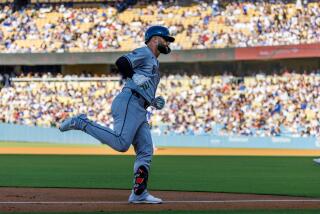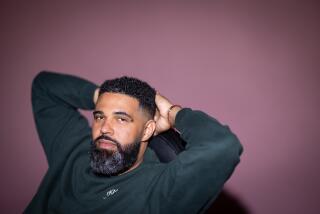One Player Who’s Sitting Pretty : Game 3: Darrell Walker doesn’t mind his reserve role for the Bulls.
- Share via
CHICAGO — In nine of Chicago’s 15 playoff games, Darrell Walker hasn’t played a minute, hasn’t taken off his sweats. That includes the first two games of the NBA Finals. In the six games he has played, Walker has averaged 2.8 minutes per game. He is having the time of his life. “Somebody said to me the other day that this not playing must be difficult. Hey, I wasn’t playing five months ago when I was sitting at home in Little Rock, watching ‘All My Children’ and ‘The Young and the Restless.’ This is wonderful.”
Darrell Walker, before the Bulls called in January, had played 10 seasons, which was exactly 10 seasons longer than he’d ever dreamed of playing. He’d played for bad Knicks teams, bad Nuggets teams, bad Bullets teams and even a relatively bad Pistons team. The Darrell Walkers, not Michael Jordan or Charles Barkley, are the rank and file of the NBA, the very foundation. They find some facet of the game they can master to some degree, and make themselves invaluable to somebody. Walker in his career has played 40 minutes a night, many of them trying to guard Jordan, now his teammate. Those were dues; now, sitting way down toward the end of the Chicago Bulls bench is a career’s reward.
“To be on this team,” Walker said, “I have to continually pinch myself. All you can ever ask for is a chance to play on a championship team. Ask Bob Lanier what he’d trade for that chance.” Nearby stood Lanier, for more than a decade one of the league’s best centers. Lanier, who played for the Detroit Pistons, never played in the NBA Finals. “Neither did Sidney Moncrief,” Walker said, ticking off a fellow Arkansas alumni and another decade-long star without a title on his basketball resume. “Those are probably two Hall of Famers, and neither saw a minute of an NBA Finals.”
Walker is appreciative to the point of being lightheaded. The Bulls called him in January. He had played the 1991-92 season with the Pistons, then had gone home, wondering if his NBA career was over. The Bulls needed somebody who could play defense down the stretch and in the playoffs against either point guards or shooters. Most kids who play basketball grow up wanting to score all the points. But you grew up in Chicago in the ‘70s, as Walker did, and you wanted to be like Jerry Sloan and Norm Van Lier, which means you played defense, you made a nuisance of yourself. Walker could always play defense. He could never shoot. Everybody knew of him as the defensive guy. He played at Corliss High School. I grew up about 13 blocks from Walker. No offense, we all thought we were better than Darrell Walker. Darrell Walker’s going to Arkansas! To do what, play football? Darrell Walker couldn’t beat me in a game of H-O-R-S-E! You’re kidding, right?
Most kids who play ball think offense is basketball. Walker, who grew up in love with the Blackhawks, wanting to be the next Stan Mikita, figured that if he had a future in basketball it was playing defense. He got to Arkansas, and Eddie Sutton reinforced that belief. Moncrief, one of the best defensive guards of the ‘80s, was an obvious symbol of what Walker could attain.
Day by day, he worked and got better. At everything. To the point he was in shouting distance -- 10 points, 8 rebounds, 8 assists -- of averaging a triple double for the Bullets a few years ago. Jordan, just to name one, had a long list of people he’d rather face on a given night than Walker. “Long fingernails, determined defensive player,” Jordan said this week.
There doesn’t seem to have been a minute of his 10 seasons Walker hasn’t enjoyed, even the bad teams, even being traded, even putting up with Hubie Brown in New York. “And those four years in D.C., laboring,” he said of his tenure with the Bullets, “were a great time, playing for Wes (Unseld). We just didn’t have enough manpower. They still don’t. Four years ago, though, the year John Williams got hurt, we could have made some noise. We had a healthy Bernard King, Jeff Malone, and a young Harvey Grant. That wouldn’t have been a bad team, and I can promise you it was a team nobody played harder than. I always thought Wes appreciated my effort.”
Now, effort is something Darrell Walker puts forth mostly in practice, trying to hone his defensive skills against the best scorer in the history of basketball. “Four times a year was okay,” Walker said, “but every day? I just try to challenge him and keep him out of the middle of the lane. He’s a player with skills I’ve never seen, including Dr. J (whom Walker also guarded). I mean, we’re talking about a guy who averaged 37 points for an entire season. Thirty-seven! Do you hear what I’m saying, 37!”
Some teams bring in hired guns to score points in the playoffs; Portland brought in Walter Davis at the end of his career a few seasons ago. The Bulls have enough guns; they need somebody to shield the rest of the team from opposing guns. That’s why Walker’s in a Chicago uniform. He’ll get some minutes in Chicago Stadium, and the people there who knew him when will go crazy for one of their own, an honorable kid who took a little talent and turned it into a long, productive career at the highest possible level.
It’s too bad the Bullets weren’t good enough that people in Washington could have gotten some sense of how good a player Walker was in his prime.
“I never even thought I’d play professional basketball,” Walker said. “I always thought it would be hockey or baseball. It’s been 10 years I’ve been around. A lot of so-called offensive players are looking at the finals now. They’d probably like to be in my seat on the bench.”
More to Read
Go beyond the scoreboard
Get the latest on L.A.'s teams in the daily Sports Report newsletter.
You may occasionally receive promotional content from the Los Angeles Times.










